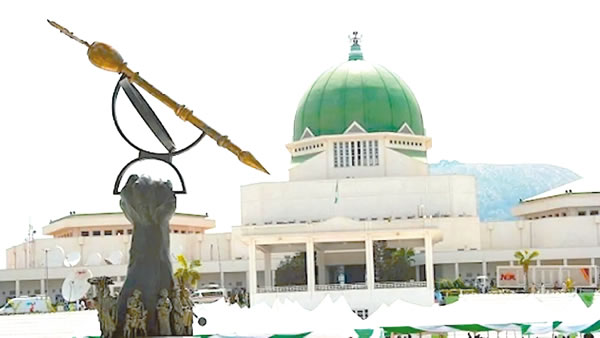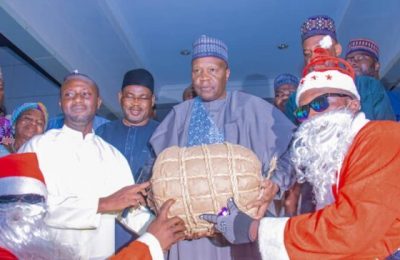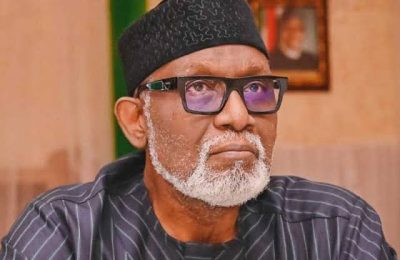
How much do Nigeria’s federal lawmakers earn? In a country where the majority of its citizens are battling extreme poverty. Is it economically expedient for just one person to earn over N20 million of taxpayers’ money in salary and allowances as being allegedly paid to national lawmakers? JOHN AMEH writes that the issue of lawmakers’ package has since the return of democracy remained a question without any answer.
THE question over the pay package of members of the Nigerian National Assembly -senators and House of Representatives members – is one which has received no satisfactory answer(s) since the country’s current democratic journey began in 1999. It is a huge problem that comes and goes in every session, term of the legislature but has yet to get any solution.

Ordinarily, it would have been easier to go with the figures quoted by the official public agencies empowered by law to fix the remunerations of the legislators. This hasn’t happened because Nigerians try to match the flamboyant lifestyles of their lawmakers with the official pay package and convincingly come to the conclusion that they do not tally! It is also harder to believe when the majority of lawmakers speak about their pay package, making the whole scenario laughable, considering the ostentatious displays by these elected representatives.
Ask a senator or a member of the House of Representatives about his/her monthly salary for example, he/she may quickly give you a figure ranging from N600,000 to N740,000 “after deductions.” Now, Nigerians do a rough mental calculation by looking at the figures -a legislator earning N600,000 net salary monthly will have a yearly tally of about N7.2 million or N8.8 million in the case of N740,000. It also means that in a term of four years, the total earning will round up to either N28.8m or N35.5m. Why the electorate can’t wrap their heads around this scenario is that this same representative owns a fleet of cars with the market price of the least far above N35 million! Their lawmaker also owns choice properties in exclusive neighborhoods (some in foreign lands); flies first class; can spend the weekend across three world-known cities – Dubai, London, Las Vegas – and spends loads of cash without any qualms.
Of course, there are senators and members of the House who are wealthy on their own. Those in this category already made waves either in the corporate world, ran megabucks businesses or held several strategic positions before seeking election to the National Assembly. The members of this club, and Nigerians may agree with them, will proudly tell them that they didn’t come to the legislature to get rich. They are at the parliament either to truly serve, protect some political interests or get some cover to further advance their business opportunities.
Yet, the lawmakers in this club are a negligible number out of the 109 senators and 360 members of the House of Representatives. As a matter of fact, they can easily be counted. However, the point has to be made that they all claim their salaries and other packages as well!
So, how much do the lawmakers earn? Last week, the public was again thrown into the confusion that often results from the attempts to answer the question since 1999. The Chairman, Senate Committee on Sports, Sen. Suleiman Abdulrahman-Kawu, a member of the New Nigeria Peoples Party (NNPP), in an interview he granted the Hausa Service of the British Broadcasting Corporation (BBC), told Nigerians that a senator is paid N21m monthly, besides disclosing that the pay package of senators had been recently increased.
Senator Abdulrahman-Kawu stated, “My monthly salary is less than one million naira. After deductions, the figure comes down to a little over N600,000.”
But, explaining further, Abdulrahman-Kawu, a former member of the House of Representatives and ex-aide to former President Muhammadu Buhari, added, “Given the increase effected, in the Senate, each senator gets N21 million every month as running cost.”
The Kano senator’s revelation came just a few hours after the Chairman of the Revenue Mobilisation Allocation and Fiscal Commission (RMAFC), Mohammed Bello-Shehu, informed the public that the pay package of the senators as fixed by his agency is N1.063million monthly.
RMAFC is the body created by an Act of the National Assembly to fix the remunerations of political office holders, including the President, the Vice-President, legislators and others.
Incidentally, Bello-Shehu was reacting to another disclosure by a vocal former senator, Shenu Sani, who said the pay package of senators was N750,000, apart from the ₦13.5m they also picked as running costs.
Another former senator, Elisha Abbo, joined the conversation when he revealed that in his days at the Senate, he was paid N14.4m monthly. Abbo also said the pay package had now been jacked up to N29 million for the current serving senators.
His words: “When I was in the Senate, cumulatively, all the allowances were N14.4m per month. You have a wardrobe allowance, a vehicle allowance, and other allowances put together that were N14.4m, including the N1million salary. It is about N29m now. N29million looks big on paper.
“I am saying this as an honest man. I am not trying to support the National Assembly, and I have been a member of that vilified institution for five years. I am not standing with them, but I will bear the facts on the table.”
But, making his clarifications, the RMAFC boss explained that the total monthly pay was pegged at N1.063million
The RMAFC chairman’s reaction partly reads, “This (statement) is in view of the recent statement made by Mr Shehu Sani, a former senator of the Federal Republic who was reported to have disclosed to the public that each senator collects a monthly running cost of ₦13.5million in addition to the monthly ₦750, 000.00 prescribed by the Commission.”
Bello-Shehu gave a breakdown of the pay package thus, Basic Salary – ₦168,866.70; Motor Vehicle Fuelling and Maintenance Allowance – ₦126,650.00; Personal Assistant – ₦42,216.66; Domestic Staff – ₦126,650.00; Entertainment – ₦50,660.00; Utilities – ₦50,660.00; Newspapers/Periodicals – ₦25,330.00; Wardrobe – ₦42,216.66; House Maintenance – ₦8,443.33, and Constituency Allowance – ₦422,166.66.
The RMAFC boss also mentioned regular and non-regular allowances, which he said covered expenditure heads like furniture, (₦6,079,200) and severance payment (₦6,079,200), though the last was done at the end of the four-year tenure.
Then, he added, “The Commission also wishes to use this opportunity to state that any allegation regarding other allowance(s) being enjoyed by any political, public office holder outside those provided in the Remuneration (Amendment) Act, 2008 should be explained by the person who made the allegation.”
Recall that former President Olusegun Obasanjo, while playing host to some National Assembly members a few days ago, accused the lawmakers of fixing their own pay package and allocating other funds to themselves, pointedly telling them that they got N200 million each.
Abdulrahma-Kawu, apparently was trying to deny Obasanjo’s accusation, but ended up adding to the controversy when he said his total pay was N21million monthly.
From the above submissions, some deductions can be safely made. It has been established that there are salaries, allowances earned by the lawmakers, and what they call ‘running costs.’ It is also established that what RMAFC fixed for senators as their total package is N1.063 million monthly. The submissions of a serving senator and two former senators also confirm that the lawmakers are paid way beyond RMAFC’s ceiling of N1.063m. Their pay is in the range of N13.5million to N29million!
Clearly, there is confusion, and this has triggered a fresh debate. Are the lawmakers fixing jumbo pay packages for themselves? Is there a uniform pay package for all senators, apart from the extra allowances paid to presiding and principal officers? Is RMAFC aware that the pay the lawmakers take home is far above its recommendation? Has the agency done anything about it? Does this call for further interrogation of the budget of the National Assembly?
The Senate insists it does not fix pay for itself. Its spokesman, Yemi Adaramodu, while replying to former President Obasanjo and giving its stance on the controversy, had denied that the lawmakers fixed any pay for themselves outside the recommendations of RMAFC.
Adaramodu said, “To straighten the records, the Senate receives only the salary allocated constitutionally by the Revenue Mobilisation Fiscal Allocation Commission.
“We challenge anyone who is privileged, either in qualified or absolute position, to bring forth any contrary fact.”
Outside this official position, which is open to the public to judge, in the light of the submissions of RMAFC, Obasanjo, Abdulrahman-Kawu, Shehu Sani and Abbo, not many senators would want to speak further on the matter. One senator simply referred this writer to Adaramodu, insisting that it was his duty to speak on such matters. It remains what it is; no conclusive answers.
Years back, Nigerian lawmakers were reputed to be the ‘highest paid’ in the world. The unverified assertion lingered for long until the National Institute for Legislative and Democratic Studies (NILDS), a brain-child and research arm of the legislature, tried to counter it and put the matter to rest.
The research finding, made available in 2015, a year the Naira still had a fairly better standing against the US Dollar, surveyed nine countries – India, the United States of America (USA), the United Kingdom (UK), Tanzania, Singapore, Nigeria, Kenya, the Philippines and Australia.
A report by BusinessDay on October 14, 2015, indicated that NILDS gathered its data for the research from the Congressional Research Service, which works exclusively for the US Congress; Library of Commons from UK; Salaries, Allowances and Pension of Members of Parliament Act from India; Legislative Council Secretariat, 2012, Remuneration of Members of Parliament in Singapore; Parliamentary Remunerations and Entitlements Research Paper from Australia; and Nigeria’s RMAFC, among others, to arrive at its conclusion.
The report showed that, “Philippines’ lawmakers emerge first in global pay ranking, with annual basic salary of $4,497,957; followed by their US counterparts where a senator takes home $3,409,422 and a member of the US House of Representatives receives $1,429,909 per annum. The list is followed by Kenyan federal legislators, who earn $968,013 per annum, followed by Australia, who takes home $646,230, while those in the UK go home with £494,285.43. This is closely followed by Indian lawmakers with $474,484 annually; Singapore and Tanzania with $253,469, and $230,961, respectively.”
According to the research, “Nigeria comes ninth on the list with a Nigerian senator having a take home pay of $184,961, while his House of Representatives counterpart earns $166,739 per annum.”
A breakdown of the salary and allowances of the Nigerian lawmakers, according to the finding, came close to the same figures earlier presented by RMAFC above. The Naira/Dollar rate in 2015 was around N150/1USD.
The bigger question
Is the senators’ official pay really okay for them? Do they deserve a raise, or are they really working hard to earn a raise? What are the responsibilities they shoulder daily?
Members of the National Assembly, in fairness to them, carry a huge burden, which compels them to bear and cater for the financial responsibilities of so many constituents and hangers on, different from what is obtained in many other democratic jurisdictions across the globe. While in other climes, the job of the legislator is restricted primarily to lawmaking, in Nigeria, the electorate expect their lawmakers to also perform functions spelt out in the laws for the Executive branch.
In Nigeria, a senator is expected to build roads, schools, provide houses for voters, pay school fees, provide security for communities, marry wives for supporters, buy cars, launch economic empowerment programmes, make monthly cash transfers to party loyalists, local associations and groups, etcetera.
Try as they do, to ring it in the ears of the people that these are not their duties, the efforts always end in futility. While this is not a defence for the lawmakers, evidently, there is no way the official pay of N1 million can attend to all of this! Is that a justification to fix pay for themselves? No. There has been a clamour by the lawmakers for years for a pay rise. This hasn’t passed successfully, at least from the perspective of public scrutiny. Isn’t this a high time the pay package of lawmakers was reviewed officially? Maybe.
As part of the solution, amid the dwindling resources Nigeria is confronted with today, many suggestions, including dissolving one arm of the bi-camera legislature or conducting part-time sittings, have been offered in order to cut costs. None of these has been heeded.
Year-in-year-out, the cost of running the two arms of the National Assembly and its affiliated bodies has ballooned, climbing to over N344.85 billion in the current 2024 budget.
When all other planned expenditure tied to the National Assembly, including the N100bn for zonal intervention projects and votes for the completion of ongoing projects are put in the net, the legislature will draw up to N514bn from the budget this year. The approved N344.85bn passed by the Senate and the House of Representatives, apart from being the legislature’s highest share since 1999, also represents a 74 percent increase of the 2024 proposals.
Following the known expenditure pattern in the National Assembly, the money will be rationed to the Senate; the House of Representatives; the National Assembly bureaucracy; the National Assembly Service Commission (NASC); the National Institute for Legislative and Democratic Studies (NILDS) ; and the National Assembly Budget & Research Office (NABRO).
An Infomedia tracking of the National Assembly’s budget shows that from N2.2bn in 1999, it rose to N29.5bn in 2000; and in 2002, it was N28.2bn before it dropped to N23.3bn in 2003.
The funding for the legislature and its affiliated bodies began a gradual rise again in 2004 when the budget increased to N34.7bn, followed by N55.4bn in 2005; but dropped to N45bn in 2006. The budget climbed to N60bn in 2007; N73.7bn in 2008; N123bn in 2009; and N154bn in 2010.
Findings reveal that in 2011, due to public outcries over the perceived high cost of running the National Assembly, its budget dropped to N111bn, but rose again to N150bn the following year (2012). Between 2012 and 2014, the National Assembly’s budget remained at N150bn, though another round of public outcries, scaled it down to N120bn in 2015; N115bn in 2016; and a rebound to N125bn in 2017.
After a rise to N139.5bn in 2018, the budget dropped again to N128bn in 2019 and 2020 respectively. It was further learnt that by 2021, the budget rose to N134bn; N139bn in 2022; and N228.1bn in 2023, excluding a separate supplementary appropriation of N70bn in 2023. The 2024 figure of N344.85bn is the highest allocation to the National Assembly in the last 24 to 25 years.
The lawmakers have, however, routinely complained of low budgeting for the National Assembly each year, arguing that funding over the years has hardly been enough to cover the operations of the legislature and its bodies. One top official noted that the problem since 1999 had been that Nigerians only understood funding for the National Assembly to mean the salaries and allowances of senators and members of the House of Representatives.
The senior official stated, “People often reduce the issue of funding of the National Assembly to allowances or salaries. For instance, they think this N334.85bn for 2024 is for salaries or allowances.
“They forget that the National Assembly is an arm of government; it has other bodies that draw money from the same source.
“There are countless legislative duties like oversight visits, investigative hearings, committee functions and so on.
“What about the bureaucracy of the National Assembly, which caters for about 4,000 employees? What about legislative aides? What about the National Assembly Service Commission? We have NILDS, you name it.”
The official added that the N334.85bn budgeted for 2024 would be about “1.16%” of the year’s federal budget, saying, “This is a drop of water in the ocean, considering the huge responsibilities vested on the legislature to execute.
“Yes, the money is big on paper, seeing that it’s the highest since 1999. But, in reality, it still hovers around the 1% allocation the National Assembly has always had for many years.
“If you check the Naira-Dollar exchange rate of today, you can indeed say that the National Assembly is far more underfunded now than 10-15 years ago; that is the reality”, the official further argued.
A call for transparency
The latest revelations have engineered more calls for transparency in the management of the funds of the National Assembly and the pay package of lawmakers. A pattern over the years is to keep the details of the budget of the Legislature out of the nation’s budget when passed. This has to change for openness. The wall of secrecy should be broken.
For example, the Socio-Economic Rights and Accountability Project (SERAP) is asking for the full disclosure of the earnings of lawmakers, including “running costs.”
Kolawole Oluwadare, SERAP’s Deputy Director, demanded of the National Assembly to “promptly disclose the exact amount of the monthly running costs of millions of naira currently being paid to and received by members of the national assembly and the spending details of any such running costs.”
The body, which is also calling for an investigation into the conflicting figures on the pay package of the lawmakers, stated further, “The allegations that members of the national assembly are fixing their own salaries, allowances and running costs are entirely inconsistent and incompatible with the constitutional oath of office and the object and purpose of the UN convention against corruption to which Nigeria is a state party,” the statement reads.
“We would be grateful if the recommended measures are taken within seven days of the receipt and/or publication of this letter.
“If we have not heard from you by then, SERAP shall take all appropriate legal actions to compel you and other members of the national assembly to comply with our request in the public interest.
“Accounting for and returning any misused or mismanaged running costs collected by members of the national assembly would build trust in democratic institutions and strengthen the rule of law.
“Accounting for and returning any misused or mismanaged running costs collected would also enhance the ability of the lawmakers to effectively and efficiently discharge their constitutional and statutory responsibilities.”
Many have advised the 10th National Assembly to toe the path of the 8th Senate and the 9th House of Representatives, both which took the bold step of making open the details of the budget of the Legislature.
While then Senate president, Bukola Saraki, in a response to persistent pressures from BudgIT Nigeria, released the details of the 2018 budget of the parliament, in the 9th Assembly, it was the Speaker of the House of Representatives, Rep. Femi Gbajabiamila, who championed it.
Would Nigerians be asking for too much, if once again they asked their representatives of today to borrow a leaf from Saraki and Gbajabiamila’s books by releasing details of the budget of NASS for the current year?
READ ALSO: Lagos govt arrests six for urinating on rail track







